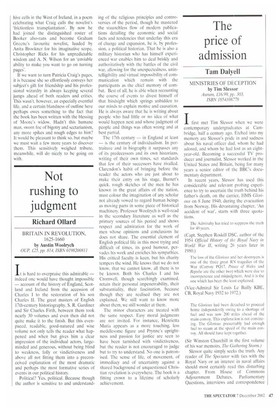The price of admission
Tam Dalyell
MINISTRIES OF DECEPTION by Tim Slessor Aurum, £16.99, pp. 303, ISBN 1854108778 Ifirst met Tim Slessor when we were contemporary undergraduates at Cambridge, half a century ago. Etched into my memory are Slessor's pride in and sadness about his naval officer dad, whom he had adored, and whom he had lost as an eightyear-old. Becoming a successful TV producer and journalist, Slessor worked in the United States and Britain, being for many years a senior editor of the BBC's documentarydepartment.
In recent years, Slessor has used this considerable and relevant probing experience to try to ascertain the truth behind his father's death, on the carrier, HMS Glorious on 8 June 1940, during the evacuation from Norway. His devastating chapter, 'An accident of war', starts with three quotations.
The Admiralty has tried to suppress the truth for 40 years.
(Capt. Stephen Roskill DSC, author of the 1954 Official History of the Royal Navy in World War II, writing 26 years later in 1980.)
The Loss of the Glorious and her destroyers is one of the three great RN tragedies of the War (Convoy P017, Prince of Wales and Repulse are the other two) which were due to incompetence and misjudgment. And it is the one which has been the least explained.
(Vice-Admiral Sir Louis Le Bailly KBE, CB, Royal Navy 1932 to 1972.)
The Glorious had been detached to proceed home independently owing to a shortage of fuel and was now 200 miles ahead of the main convoy. This explanation is not convincing. The Glorious presumably had enough fuel to steam at the speed of the main convoy. All should have kept together.
(Sir Winston Churchill in the first volume of his war memoirs, The Gathering Storm.)
Slessor quite simply seeks the truth. Any reader of The Spectator with ties with the Royal Navy or an interest in naval affairs should most certainly read this disturbing chapter, From House of Commons Adjournment Debates, Parliamentary Questions, interviews and correspondence
with ministers, Rt Hon. Alan Beith MP and I know that once Whitehall has pronounced on an issue, such as the circumstances of the loss of HMS Glorious, its verdict will be defended, whatever the cost to society in terms of truth and justice.
The way in which he was treated by the authorities over the circumstances of the death of his father and 1,518 other personnel, the biggest loss of the second world war — 1,415 went down with HMS Hood, and 840 with the Prince of Wales and Repulse — led Slessor in his retirement to look at other 'similar cases'. In this meticulously researched book, he demonstrates the lengths to which officialdom is prepared to go in order to maintain the fiction that the emperors are fully clothed, when all too often there is obvious evidence to the contrary.
Slessor's sceptical curiosity has led him to examine the treatment of the Ibis people by the British Government — a dispute which at the time of writing is still proceeding in Court 73 of the Royal Courts of Justice; the sinking of the Belgrano; the loss of the Chinook helicopter over the Mull of Kintyre, transporting the cream of Northern Ireland Intelligence: Gulf War Syndrome; the case of Major Miles Stankovic MBE of the Parachute Regiment and Colonel Carter of the Royal Marines, sacked from the embassy of Peking.
Slessor maintains that in some cases the motive for governmental obduracy is clear: to admit an error might involve paying compensation or, worse, someone could have been held to account for their mistakes. But in others little seemed to be at stake except loss of face. Perhaps Slessor underestimates the 'ridicule factor', the 'ribaldry factor' and the 'embarrassment factor' in Whitehall or Westminister.
In yet other cases, it may be a matter of what a tangled web we weave, when first we practise to deceive. What can begin as a bit of press-office spin or even a necessary (at least at the time) piece of official dissembling can quickly become a permanent 'truth'. It then becomes necessary to devise further lies and more elaborate cover-ups, which, in turn, provoke more awkward questions. This is then the chemistry of a major scandal. The cases described in Ministries of Deception are indeed scandals, instances of outrageous injustice to groups and individuals perpetrated in the name of the state and then denied by apparently unaccountable officials using all the powers of the Whitehall machine.
To expose these abuses of authority, Tim Slessor has carried out interviews in depth. I can testify at first hand how stringently he interviewed me for the chapters on the Ibis and the Belgrano. He has used retirement to dig deep into official and unofficial files, and has tapped sources inside and outside Whitehall. But his volume is the more powerful for having presented fairly the case for the authorities. I hope Ministries of Deception is widely read in Whitehall. Thoughtful and good civil servants — in my experience, 99 per cent of senior civil servants are thoughtful and basically good people — might conclude that candour, however unpalatable, should be displayed at the first possible moment in awkward cases.











































































 Previous page
Previous page